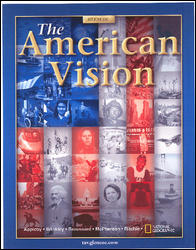The American VisionChapter 2:
Colonizing America, 1519–1733Web Lesson PlansIntroduction
Students have read about the English settlement of the Middle Colonies during
the 17th century. In this activity students will research William Penn and
the government he established in Pennsylvania.
Lesson Description
Students will use information from the William Penn Web site to learn about
William Penn and the establishment of Pennsylvania. Students will read about
the early life of Penn, his desire to establish a tolerant government, the creation
of Pennsylvania's provincial Assembly and the Charter of Privileges, and the
success of the colony. Students will then answer four questions and apply this
information by creating a poster that advertises Pennsylvania for settlement.
Instructional Objectives- Students will identify William Penn and examine the principles upon which
he established the government of Pennsylvania, one of the Middle Colonies.
- Students will be able to use this knowledge to create a poster that advertises
Pennsylvania for settlement.
Student Web Activity Answers- Penn respected the Native Americans who inhabited the Pennsylvania territories.
Even though the King had granted him a charter to the area, Penn was careful
to purchase the land from the Native Americans. This set a precedent for peaceful
negotiations between Native Americans and Pennsylvanians.
- The Assembly passed laws protecting the freedom of conscience, or freedom
of religion. Additionally, in a time when death was an acceptable punishment
for many crimes, the Assembly established only two crimes as punishable by
death—murder and treason.
- Pennsylvania was exporting lumber, furs, hemp, tobacco, iron, and copper
in exchange for high-quality British goods. The population was growing so
fast that Penn purchased more land along the Susquehanna River, and the Pennsylvanians
lived peacefully with nearby Native Americans. Philadelphia, Penn's beloved
city, was second only to Boston in population.
- During Penn's second stay in the colony, the colony adopted the Charter
of Privileges. This constitution provided that the elected Assembly had the
power to initiate bills rather than simply approve or reject those submitted
to it by the governor. The Charter was important because it was a step toward
self-government in America.
- Students' posters will vary.
 | 






